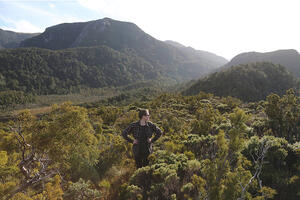
-
Qualification and GIS component studying for: BSc Environmental Science & Geography
-
GIS component: GIS & Remote Sensing, Advanced Remote Sensing, Working with Geographic Data
-
Tertiary Institute: Massey University (extramural – Palmerston North)
-
What Year 13 school subjects did you take: Geography, Biology, English, Calculus, Art & Design, Health Studies (This was a long time ago!)
-
What Secondary School did you attend: Carine Senior High School, Perth Australia
Why have you chosen to study GIS?
I had never even heard of GIS when I first started my degree, a double major in Environmental Science and Geography. As a graphic designer by trade, I’ve always liked maps and data as forms of visual communication, so the moment cartography and spatial analysis was introduced in a first year human geography paper, it grabbed my attention. As concepts of GIS continued to arise in different courses, I began to see just some of the countless applications of this discipline and realised that this may just be the perfect combination of my two loves: design and science.
How important is GIS for your future career options, and why?
Aotearoa New Zealand is faced with many challenges working toward a more sustainable future: from mammalian predator control, to development, and horticultural and agricultural hurdles. These issues are part of complex systems, many are wicked problems, and new technology and ideas are required to solve them. My career goals are to contribute to greater environmental and social sustainability, and I think GIS and its related technological innovation is absolutely important to this.
How has studying GIS shaped your career goals?
Environmental Science and Geography are broad subject areas and I have been fascinated with every topic I come across. Studying GIS has helped to narrow my focus for my career goals and think more creatively about how to specialise my skillset.
What advice would you give to future students considering adding a GIS component to their studies?
I would strongly encourage anyone to add GIS to their studies, as it’s applicable to countless fields and will only add depth to your understanding of systems and spatial thinking.
One thing working as a designer has taught me, is that having general knowledge is one of the biggest strengths, as it allows you to draw on influences and ideas from different areas. In a way, this is also true for GIS – it is far more than just the software and awareness of your topic from different angles will help you think about what questions may be able to be answered with geographic data.
Given you are studying GIS via distance learning what tips can you give about studying GIS this way and about distance learning at this time when people are at home because of COVID-19 and may be doing some GIS online learning of their own?
Studying a technology based field from home is ideal. We are incredibly fortunate that the only tools we need to study GIS are a computer and an internet connection, and we also have brilliant technology for support from a distance – with free screen sharing apps and video calls.
The only issue I have come across studying GIS by distance is the incompatibility of some operating systems with certain software (eg ArcGIS won’t run on Mac). If studying through a tertiary institute, you should be able to get around this with a remote desktop set up, and if studying independently there are alternative software applications (eg QGIS) which you can use to learn the principles.
Lastly, for support, there are online forums (like GIS on Stack Exchange) or communities (eg on LinkedIn) where you can reach out with questions.
Last year you applied successfully for a LINZ external tertiary GIS scholarship. What difference has this made to you and your GIS study courses?
It’s very encouraging to be recognised for my achievements and ideas about GIS so far, and this has made me only more motivated to continue on this path. Thank you LINZ!